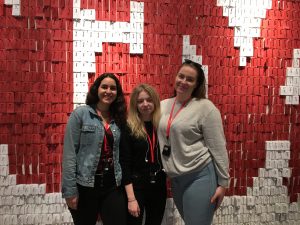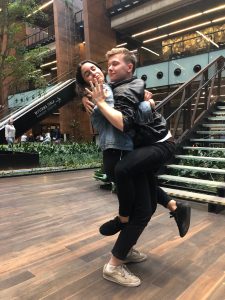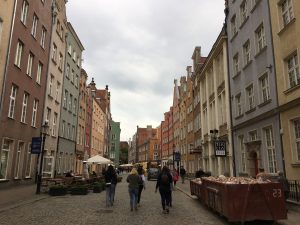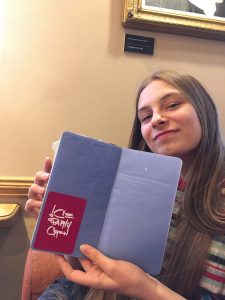I genuinely enjoyed each of the museums we visited over the course of the trip, but to my surprise, the European Solidarity Centre was my favorite. My experience was definitely enhanced by the discussion with the museum director and the accompaniment of the Warsaw students.
During the discussion, I felt too exhausted to appreciate what he was saying in the moment. However, while roaming through the museum and reflecting upon the conversation in hindsight, he allowed me to better understand the universality of certain themes and Poland in the context of the rest of the world. The main point of his discussion was religious radicalization in which he mentioned the Iranian Revolution. My ears perked up when he mentioned Khomeini in Iran along with other countries in the world where religion played similar roles as it was in Poland. This conversation allowed me to understand the important role religion played in Polish identity because it synthesized what I had learned in class with what I know about my families past. This course has encouraged me to inquire about my families experience escaping Iran during the revolution, to learn more about the reasons why they had to leave, and to listen to their personal stories. I really appreciate this aspect of the course and how it stressed the importance of history, learning from primary accounts, and preserving memory. Because of this, I had asked my parents about their stories and was able to better understand the idea of religious radicalization in our discussion. For these reasons, I believe that a global perspective is not only beneficial but necessary in understanding history and human behavior and tendencies in general.
In addition, although the University of Warsaw students seemed like a distraction during the tour, they guided me through the museum and further elevated my understanding of Polish history. They allowed me to see the museum through two different lenses; one as an American college student learning about Polish history as an outsider, and the other as a Polish college student studying the recent past of their country of which their parents and grandparents lived through with stakes in how this affects their current lives. I think this is a very valuable addition to my experience at the museum even if it was not necessarily a planned portion of the trip. I approached the exhibits trying to find things I had read about in our secondary sources and looked through it in a more serious and academic manner. Contrastly, the Polish students, having this history ingrained in their minds and constantly around them, glided through as if they were escaping the history that infiltrates their daily lives. They were able to answer any questions I had asked them and were knowledgeable about anything I pointed out. These students are so much more than their countries history and I could not imagine having the history of my country color the way the rest of the world looked at me and have to be constantly reminded of the past.
As much as these students served as an academic resource for me, I think of them as really cool, new friends of mine. I am fascinated by how similar I am with these students and how easily and quickly we all connected. It took me longer to become this friendly with Claire! Thanks to globalization, the internet, and social media we had no trouble engaging in conversation and sharing laughs. I really respect these students and was able to learn a lot from them as people. Julia Saskia (aka Julia #3 with long hair) really impressed me with all of her knowledge, her strong and interesting opinions, her broad perspectives on issues, her fashion sense, and her overall uniqueness. She carries around a journal and asks friends and strangers to write whatever they want in it. She handed me the journal and I can’t explain why, but writing in it was one of the most cathartic experiences I’ve ever had. I really admire her and hope to keep in touch with her and implement the things she does in her life that inspire me into my own life. As much as these students made an impact on me, I know I made an impact on them. The last part of the museum was a section where visitors can write on white and red cards and add them to the wall. Veronika decided to write me a playful message in Polish where she described how much she enjoyed our visit and was going to miss me. This little note, although I forgot the direct translation in English, really means a lot to me and I wrote her one as well.
Overall, this was one of my favorite days beginning with the train ride to Gdansk, visiting the ruins of Westerplatte, seeing the Solidarity Museum, touring Gdansk, and spending time with everyone including the university students.



